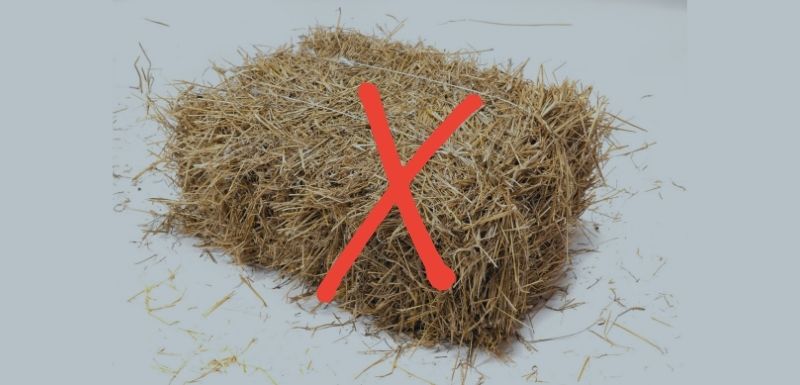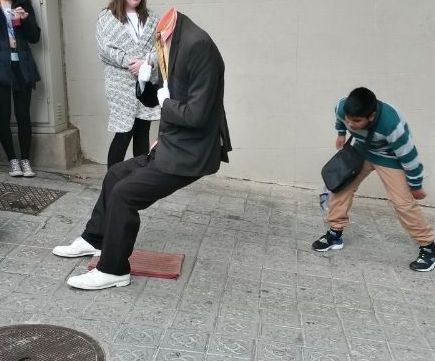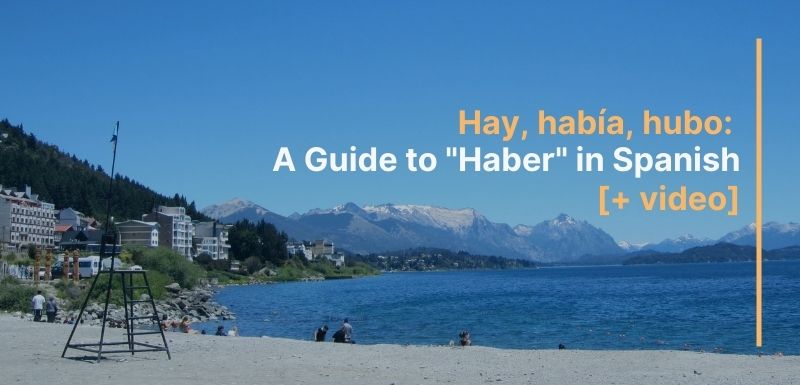Haber is a Spanish verb with a lot of uses. But we don’t usually see it in that plain dictionary form — “haber”.
Most of the time, we see haber in forms like hay, había, hubo, habrá, hay que, he, hemos and more.
In this article, we’ll cover the most important uses of haber in Spanish so that you can confidently use it in conversation.
But first, an important note at the start: don’t try to rote memorize the info below.
Like with anything in Spanish, the first stage is awareness. If this is your first time dealing with haber, get an overview. The rest will make sense as you see more context.
If you’ve already come across haber often, use the below info as a reference. Use the example sentences provided to help fill in the gaps. And you can even add them to Anki or a similar program for review.
Haber to say “there is, there are, there were, there was, there will be”
Below are 5 of the most common uses of haber. You will see these everywhere.
They’re easy to use because they don’t require any special conjugation once you know them, and help you express things in past, present and future.
1. Hay: There Is or There Are
Pronunciation is important in Spanish. Hay looks like hay, but it’s pronounced “ay” — if you say the H, people will struggle to understand you.
Hay means there is or there are. You can use it anytime you want to talk about the presence or existence of one or more things.

A few examples:
- Hay una catedral famosa en el centro de Barcelona
- There is a famous cathedral in the center of Barcelona
- There is a famous cathedral in the center of Barcelona
- Hay dos ventanas en esta habitación – una aquí, y una ahí
- There are two windows in this room — one here and one there
You can also use hay for abstract things:
- En muchos países, hay una incertidumbre económico en este momento
- In many countries, there is economic uncertainty right now
- In many countries, there is economic uncertainty right now
- Hay una oportunidad interesante
- There is an interesting opportunity
- There is an interesting opportunity
2. Había: There Was or There Were [Indefinite timeframe]
Había is used to say “there was” or “there were”. This form of haber is called the “imperfect”.
We use the imperfect to describe things that happened in the past, without a specific timeframe. Things like “when we were kids, we used to go to the beach every year”, or “A few years ago we lived in a bigger house”.
A few examples:
- Cuando era niño, siempre había mucha gente en mi casa
- When I was a kid, there were always a lot of people in my house
- When I was a kid, there were always a lot of people in my house
- Hace doscientos años, no había electricidad en ninguna parte
- Two hundred years ago, there wasn’t electricity anywhere
- Two hundred years ago, there wasn’t electricity anywhere
- Como no había suficiente interés, al final no hicieron la película
- Since there wasn’t enough interest, they didn’t end up making the movie
- Since there wasn’t enough interest, they didn’t end up making the movie
- No había muchas oportunidades allá, así que nos mudamos
- There weren’t many opportunities, so we moved
- There weren’t many opportunities, so we moved
3. Hubo: There Was or There Were [Definite timeframe]
Hubo and había are similar: they both mean “there was” or “there were”.
But hubo is used when we’re talking about something with a specific timeframe: an event that came and went. This conjugation of haber is called the “imperfect” — the simple past tense.
A few examples:
- En el 2005, hubo un huracán muy grande en Louisiana
- In 2005, there was a big hurricane in Louisiana
- In 2005, there was a big hurricane in Louisiana
- Este año hubo muchos vuelos cancelados
- This year there were a lot of canceled flights
- This year there were a lot of canceled flights
- La semana pasada, hubo un concierto en el parque
- Last week, there was a concert in the park
- Last week, there was a concert in the park
4. Habrá: There will be
We use habrá to say there will be.
A few examples:
- En el futuro, habrá cada vez más autos eléctricos
- In the future, there will be more and more electric cars
- In the future, there will be more and more electric cars
- Habrá mucha gente en la fiesta del viernes?
- Will there be a lot of people at the party on Friday?
- Will there be a lot of people at the party on Friday?
- No te preocupes, habrá otras posibilidades para volver
- Don’t worry, there will be other opportunities to come back

5. Va a Haber: There is going to be/there will be
Typically, Spanish speakers don’t use the future tenses quite as often as the “going to” tense (“ir + a + infinitive”).
This goes for haber too. In a typical, informal situation, you’re likely to hear “va a haber” more than habrá. It’s similar to the difference between “there is going to be” and “there will be”.
A few examples:
- Va a haber un diálogo entre los partidos políticos
- There is going to be a dialogue between the political parties
- There is going to be a dialogue between the political parties
- Va a haber viento más tarde
- There is going to be wind/it’s going to be windy later
- There is going to be wind/it’s going to be windy later
- Va a haber un juego de fútbol esta noche, ¿quieres ir con nosotros?
- There’s going to be a soccer/football game tonight, do you want to go with us?
- There’s going to be a soccer/football game tonight, do you want to go with us?
Haber for the “perfect” tenses
If you want to say things like I have walked, I would have walked, I will have walked — then you need haber.
In these “compound tenses”, haber is an “auxiliary verb”.
What’s an auxiliary verb? It’s one that plays a supporting (auxiliary) role. It’s not the star of the sentence.
Haber plays the role of have in the sentences above. It’s important, but “walked” is the key piece of information — otherwise we have know clue what you have done!
But without “have”, we lose nuance. We know you “walked”, but don’t know the timeframe.
And in English, we can’t say “I have walk” — we have to say “walked”.
In Spanish the same happens. We need to change caminar to caminado, correr to corrido, venir to venido, and so on.
This is called a “past participle”.
What’s great about these is that they’re a bit easier to learn than the preterite (past tense) in Spanish.
Learning the Present Perfect can give you a simple way to express things in the past without feeling the need to stare at conjugation tables.
It’s not always the ideal way to talk about the past. But people will understand you! And you’ll add more past tense tools to your toolbelt as you go.
Let’s take a look at some examples:
Haber in the Present Perfect
- He caminado – I have walked
- Has comido – Have you eaten?
- Hemos venido a verte – We have come to see you
Haber in the Past Perfect
- Había caminado – I had walked
- Habías comido? – Had you eaten?
- Habíamos venido a verte – We had come to see you
Haber in the Conditional Perfect
- Habría caminado – I would have walked
- Habrías comido? – Would you have eaten?
- Habríamos venido a verte – We would have come to see you
Haber in the Future Perfect
- Habré caminado – I will have walked
- Habrás comido? – Will you have eaten?
- Habremos venido a verte – We will have come to see you
For simplicity’s sake, there are a few tenses not covered above (Usted, he/she/it, they/you plural).
The goal here is to give you a general idea of how haber works in the different perfect tenses. Then you’ll get comfortable with using it over time through practice and exposure to real Spanish.
Last thing: note that in Spanish, haber (he, había, etc.) cannot be separated from its past participle.
For example: in English, we might say, “I have regularly eaten here”. In Spanish, modifiers like “sometimes” don’t go in between.
So we can’t say “he con frecuencia comido aquí”.
Instead, we say “He comido aquí con frecuencia.”
Useful Expressions with Haber
Perhaps most useful is the phrase “hay que”. It’s an indirect way to say that something needs to be done. It’s indirect in the sense that you’re not ordering someone specifically. Instead, you’re simply saying that something “needs to be done”.
- Hay que lavar los platos después de cocinar
- We have to wash the dishes after cooking / the dishes need to be washed after cooking
- We have to wash the dishes after cooking / the dishes need to be washed after cooking
- Hay que estudiar
- You/we/one has to study
- You/we/one has to study
- Hay que ver!
- We’ll have to see!

Hay que can also change into the past, present, conditional or future using the same forms we covered above: había, hubo, habría, habrá.
- Había que elegir entre dos candidatos
- We / one had to choose between two candidates
- We / one had to choose between two candidates
- Hubo que cancelar la fiesta de año nuevo
- The New Year’s party had to be canceled
- The New Year’s party had to be canceled
- “Habría que esperar al menos a que pase la Semana Santa para retirar las mascarillas”
- We’d/one would have to wait at least until Easter to take off the masks
- We’d/one would have to wait at least until Easter to take off the masks
- Habrá que cambiar las reglas
- We’ll have to change the rules / the rules will have to be changed
Haber is an extremely useful verb in Spanish
You’ll see it everywhere. And it has even more variations than what we covered above!
But fear not. Like with anything else in Spanish, you don’t need to memorize everything on this page to start using it. Instead, pick a few things above and put them into practice now by creating your own sentences with them.
Then, if you focus on listening to and reading lots of Spanish, you’ll start picking up the rest naturally as you go.
Done reading? Time to practice!
What words of your own could you put with haber? Think of…
- Things that need to be done (hay que)
- Things you have done (he dibujado mucho hoy)
- Things that there exist (hay una casa amarilla en la esquina)
Then write your sentence(s) in the comments for feedback!



This is a really great intro to haber, and reaally, a great way to approach learning Spanish. I was recently introduced to learning haber and was searching for resources to practice haber when I came upon your article. You really hit the nail on the head when you mention how frustrating it is to take lessons for a year and not be able to speak about the past! It occurs to me that Spanish students should be introduced to haber a lot earlier than they usually are.
Thanks Barry! Glad it resonated with you, appreciate the comment. Good luck with haber!